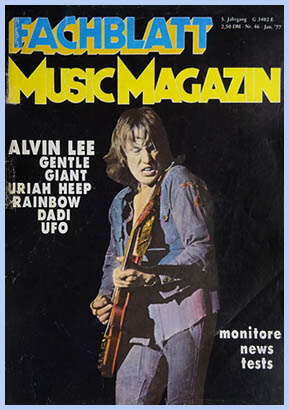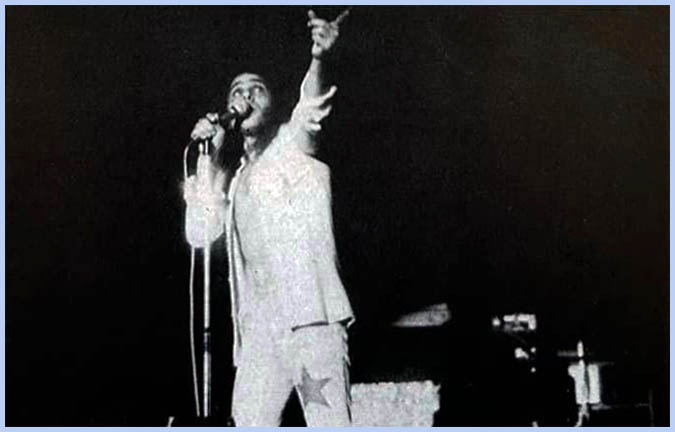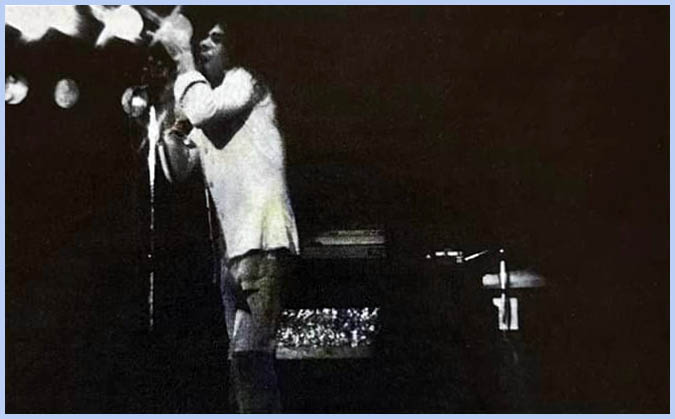|
Ronnie James Dio Fachblatt Musik Magazin Interview  While the man in black preferred to sit sullenly in his dressing room, only occasionally sticking his head out to finally calm the fans and roadies down with harsh words, there was a cheerful atmosphere in the other dressing rooms. Cozy Powell kept asking how the overall sound was, whether people liked the rainbow and a thousand other things.  The glamour-snatchers, organizers and management assistants had gathered in the main dressing room to pick at the lavishly laid out post-concert buffet. Golden yellow whiskey and clear rum were passed around in icy glasses to brighten up the RITCHIE BLACKMORE RAINBOW CREW's last evening in Germany.
The glamour-snatchers, organizers and management assistants had gathered in the main dressing room to pick at the lavishly laid out post-concert buffet. Golden yellow whiskey and clear rum were passed around in icy glasses to brighten up the RITCHIE BLACKMORE RAINBOW CREW's last evening in Germany.However, even if the effort was almost unbelievable - who can afford a computer-controlled rainbow when that alone costs 60,000 British pounds - and even if the sound was blasted into the hall with all its might, it was still not entirely satisfactory! While one would always wish for a little more professionalism in German rock, Ritchie's Rainbow was a little too much of the important thing. Perhaps it should be made clear at this point: musicians play for people, and it is the people's right to know something about these musicians. It is also clear that many musicians - and this is understandable - are now tired of answering stupid questions. There is no need to say anything more about this. That is why there will be no specialist magazine stories made up of letters from managers, lifelines from record companies or other writing. Because - who benefits from such writing? That is the only reason why one or the other will perhaps be missed in the specialist journal reports. But, we don't care! Who do they think they are! To make it clear: music is a business. Musicians, especially when they are making a lot of money, are business people. Even if they are perhaps the least of them themselves, they allow their managers to sell them out like that. In this confusion of pickpocketing, in this brutality of the shark industry, it is particularly good to be able to talk to people like Gallagher, Jon Hiseman or Ronnie Dio. Their openness, their communicative understanding is very clear, and the person sitting opposite you can see straight away that these are full-blooded musicians - and not people who want to make a fortune with rock or high-quality music. If, for example, the Aerosmith management thinks they are the greatest and therefore don't need to perform in front of small audiences, if Lofgren's manager says: There will only be an interview if you promise right here and now to make the front page with Nils - in short, if these manager types think that Germany is a madhouse of big, name-crazy journalists and only exists to collect solid currency, then it is good, then the journalist's heart beats faster, to discover praiseworthy exceptions.  RONNIE: Our concert was strange today. There was no atmosphere. In the middle of the concert the atmosphere was even at its lowest, although at the end it looked as if people wanted to say: Oh, it's over, where's the encore? But by that point it was too late. We had given all our energy, and when the audience wanted to give us some strength back at the end, it was too late. I think we really tried with the utmost effort, we played well, maybe with a few small mistakes, as they always happen, but we didn't get through. It was so strange. I think what I'm doing now is a review of the people, instead of a review of us and our music. But these things happen, they give us puzzles that we can't solve. It was similar at the Hammersmith Theatre on the first night. We wanted to play an encore, as we always do, but on the first night, even though London is Cozy's and Ritchie's hometown, we couldn't get through. So we didn't play an encore on the first night. It was like here. During the first two songs, people were still shouting "hey" and "yeah", but there was silence for the rest of the show. And then suddenly it was all over and they wanted encores, but it was just too late. But do you give people any time to give you energy? I don't know if I can give you an explanation, but I was at the concert too, and I had the impression that everything went much too quickly, people had no chance to react. Even when Ritchie played blues passages, for example, Cozy's pounding rock, the thunder of the bass and your voice came through again immediately with such vehemence that people simply didn't have time to understand and react. I mean, that's perhaps my impression, because ultimately I can't speak for the audience. RONNIE: Let me ask you a question: Did you also have the impression that our concert was too compact, that the music was too "fast"? Yes, I think so. I had the feeling that the force with which you play didn't allow you to react.  RONNIE: But we've given these concerts many times; they are and have always been the same in terms of structure. But I don't think it was just us. It just didn't work tonight. We as musicians could feel that. Of course we could have resorted to cheap tricks. We could have made the breaks between the pieces longer and we could have waited until the people started screaming. But we can't do that. It would have been dishonest and it would have destroyed our music, our rhythm. It is certainly difficult to explain, and I don't know if you can understand it if you weren't in the "Arena", if you weren't on the stage. Maybe people just wanted to hear the songs from our first LP, I don't know, I just know that we apparently couldn't give them what people expected from us today. But that doesn't change our repertoire. Our concert is OUR concert, and people MUST reject or accept us as is. Our music isn't a show-off, it's not a begging for acceptance. I mean, what use would it be to us and the audience if we behaved like that?
RONNIE: But we've given these concerts many times; they are and have always been the same in terms of structure. But I don't think it was just us. It just didn't work tonight. We as musicians could feel that. Of course we could have resorted to cheap tricks. We could have made the breaks between the pieces longer and we could have waited until the people started screaming. But we can't do that. It would have been dishonest and it would have destroyed our music, our rhythm. It is certainly difficult to explain, and I don't know if you can understand it if you weren't in the "Arena", if you weren't on the stage. Maybe people just wanted to hear the songs from our first LP, I don't know, I just know that we apparently couldn't give them what people expected from us today. But that doesn't change our repertoire. Our concert is OUR concert, and people MUST reject or accept us as is. Our music isn't a show-off, it's not a begging for acceptance. I mean, what use would it be to us and the audience if we behaved like that?We have to play the things that we feel comfortable in and with. Even if they are songs that don't even exist on an LP yet. Only in a program that we feel comfortable in can we be good, can we give the audience really good music. But I think we really shouldn't apologize for our concert, and the audience doesn't need to apologize either. The audience was good, but things weren't going well between us tonight. Perhaps I expected too much. Nevertheless, the impression remains. The violence, the constant storming of the audience, didn't leave enough time to join in. RONNIE: It's a shame that I can't tell the audience what I'm telling you. We are constantly defending ourselves on stage. The fact is: we are always compared to Deep Purple. But we want to be MORE! We want to be different, maybe we want to be more musical, whatever the effect. This situation also determines our concerts. So if people started calling for Ritchie just because he was in Deep Purple, it would destroy the unity (the spell) of our music. Jimmy, Tony Cozy, Ritchie and I are a different band. We are the Rainbow Band and not Ritchie's musicians. It's like boxing at home, you have to bring these individual currents and forces under one musical umbrella. Who is in charge in Rainbow? RONNIE: All the songs, except "Mistreated" and "Still I'm Sad", were written by me and Ritchie. So it's either me or Ritchie who dictates how a song should be. I mean, Cozy plays them the way he's used to playing, but I'm the one who says how the song should be. And I don't care what trouble it causes. They're my songs, and there's nobody who can tell me how my songs should sound. But we don't have any problems. Fortunately, Cozy, even though he's the best rock drummer in the world, plays the songs the way I want them to sound. But it's also a question of roles. Cozy plays behind me, not me behind him. I'm always in front, always in front of the audience. Even Ritchie is very rarely directly in front of the audience. He also has a guitar that he can hide behind. But I have nothing. There's just this little microphone, and I'm right at the front of the stage. If I can't get a "kick" in my voice across, people say, "hey man, that man got no voice!" Or they say: "He's not a musician!" But I wrote more than half of the songs on my own, so who's going to tell me how I want my songs to be?!  To put it another way: So many stupid people have asked: What does it mean to you to play in a band with Ritchie and Cozy?
To put it another way: So many stupid people have asked: What does it mean to you to play in a band with Ritchie and Cozy?The truth is that Ritchie and I started Rainbow, although the truth is that Rainbow is first and foremost Ritchie's band. Anyone who says otherwise is a fool. I mean, if it hadn't been for Ritchie, there wouldn't have been a band with Ronnie Dio and Cozy Powell. Ritchie's name alone made it possible. He is the star of this band, he has the image. All that's left for us is to prove that we are worthy of this challenge. I am perhaps even more worthy than Cozy, because Cozy already has his name. We simply have to prove that we are worthy of playing in a band with Ritchie. It's a challenge! That's how we got together. Today, this band is Ritchie's, Cozy's and Ronnie Dio's band. But I think I'm talking too much; I'm not answering your question. But after a show, I'm really hyped. I can't stop talking! No, it's OK. You know, in interviews I always try to express the personality of the speaker through his own words. I don't see much point in telling people what I think, what impression I had. I want to give people the opportunity to form their own opinion. RONNIE: I would like we would have such magazines back home, but anyway. I know you probably have questions that you want to hear answers to. Of course I do. Rainbow is a professional band. Cozy has spent years playing to large and small audiences, as has Ritchie. So it's to be expected that they both know exactly how to make an impact on the audience. When Rainbow songs are written, do you take this knowledge into account? RONNIE: First of all, just like Ritchie and Cozy played the clubs of the continent, I played in and out of America for 10 years. I also know how to appeal to people. But apart from the fact that we don't want to get to the top with cheap tricks, our experience naturally flows into the arrangements of the songs. But remember: we are a live band, we are not a band like Steely Dan - who are incredibly good in the studio, and who I also really like, but who don't need an audience - we are a live band that needs the audience. If we couldn't play live, there would be no reason for us to be a band. From the impression we get from the audience, we naturally know what works and what doesn't. So somewhere in the back of our minds we always have the knowledge of what things don't work, and it's only natural that we use this knowledge. But that's secondary. (You can't base your musical life on being loved or accepted by the audience.) You can't write songs just from that point of view either. You have to give something to yourself. Your own soul has to be able to feel good in your music. Maybe we are in the fortunate position that we have a lot in common with the people in the hall, and that is why our songs are always songs for the people.... Merlin Frank, Fachblatt Musik Magazin - January 1977 Photos: Brun No K. Assel |